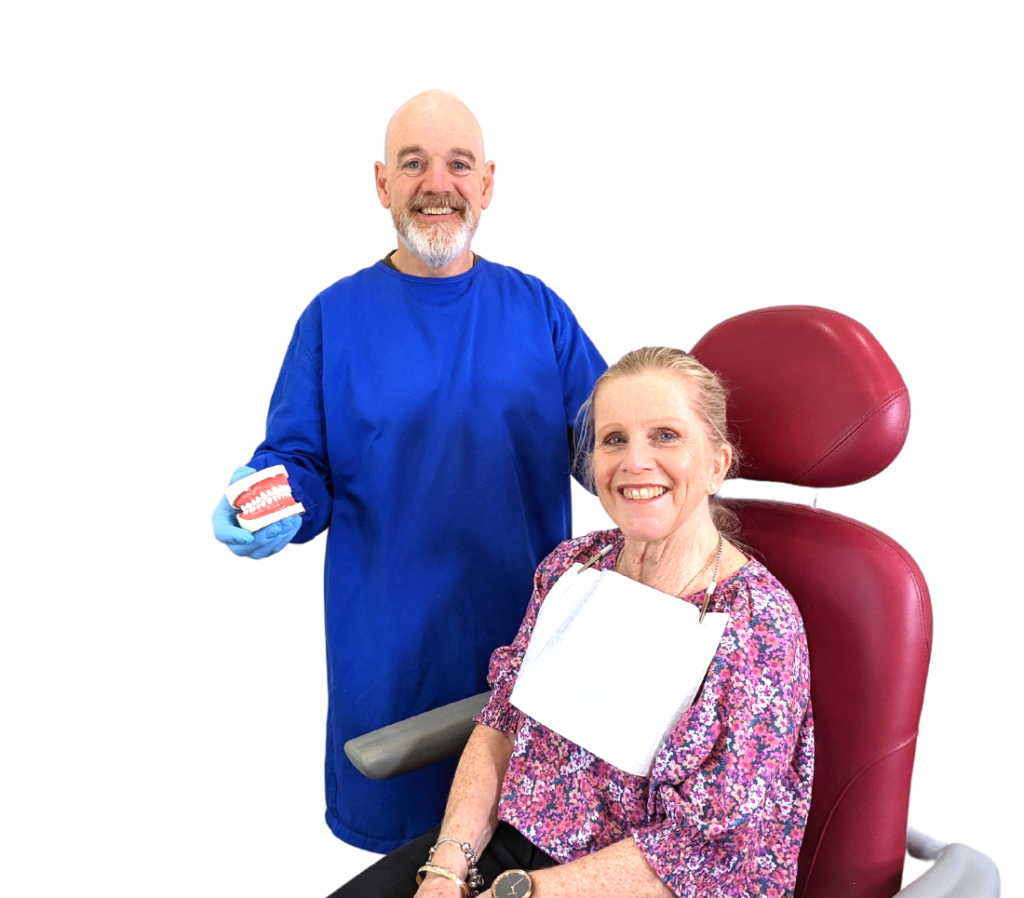Loose Lower Full Denture?

Do you have difficulties eating with your full lower denture?
Do you get embarrassed sometimes when your lower denture flops out when you are talking?
Do you find food constantly getting stuck under your lower denture?
Do you lose control of your loose lower denture?
Do you frequently get ulceration in your mouth where the lower denture sits?
Do you constantly find your lower denture impinging on your gums despite numerous adjustments by your dental prosthetist?
If you are experiencing any of the above and are looking for ways to improve on your situation; Mini Dental Implants (MDIs).
What are MDIs?
We presume that you have heard of dental implants replace missing teeth. Simplistically, dental implants are placed surgically inside the jaw and with healing ‘Osseo-integrate’ with the surrounding bone. A ‘false’ tooth is then attached to the implant.
With MDIs, the principle is the same; the only difference is the ‘mini’ signifies that they are smaller in size than conventional dental implants. So if a conventional dental implant is like a ‘bolt’; then a MDI is like a ‘tack’.
How do MDIs benefit to you?
MDIs can be used effectively to provide stabilisation to your loose lower full denture.
As you can see in the diagram, four MDIs are placed in the front part of the lower jaw. They are arranged like four footy goal posts. The threads of the MDIs osseo-integrate with the bone below the gums and the ball components of the MDIs protrude above the gum line. Metal housings with rubber O rings are positioned within your lower denture, which then slips over the metal balls of the MDIs, much like a ‘press-stud’ mechanism.
Are MDIs suitable for you?
It all depends on whether you have adequate bone volume in your lower jaw to accept the MDIs.
There are no absolute health contra-indications for MDIs. However, osseo-integration is less predictable in diabetics and cigarette smokers.
MDIs cannot be used in those who have taken bisphosphonates used to treat osteoporosis. Chronic use of corticosteroids for auto-immune disorders will lower the success rate of MDIs.
Now the Good news –
- Most of our clients with MDIs find major improvement in function and stability when chewing. They also report great comfort and confidence in their lower dentures.
- Studies have shown good longevity with MDIs.* (refer to clinical studies listed below)
- MDIs are cost effective, minimally invasive and time efficient. The surgery is done in our office with no need for off-site specialist referral.
- You will still be able to wear and use your dentures during the healing phase of the MDI treatment. (Certain precautions will need to be taken with respect to your diet and adjustments will need to be made to your dentures immediate post insertion of MDIs.)
- The MDIs work the best with well- fitting new upper and lower dentures. However, they can be retro-fitted to existing dentures as well. We will need to assess your existing dentures first to see if they will work properly with the anticipated locations of the MDIs.
- According to our guidelines, dentures need to be renewed every 8 years. The new dentures can be fabricated to accept existing MDIs. The MDIs commonly should not need to be replaced, unless advised otherwise.
References:
1, Griffitts, T.M, Collins C.P., Collins, P.C. Mini dental implants: An adjunct for retention, stability and comfort for the edentulous patient. Oral Surgery, Oral medicine, Oral Pathology, Oral Radiology and Endodontology, 100 (5): E81 – E84, 2005.
2, Shatkin, T.E., Shatkin, S., Oppenheimer, B.D., Oppenheimer, A.J. Mini dental implants for long term fixed and removable prosthetics: A retrospective analysis of 2514 implants placed over a five-year period. Compendium, 28: 36-41, 2007
3, Elsyad, M.A., Gebreel, A.A., Fouad, M.M., Elshoukouki. The clinical and radiographic outcome of immediately loaded mini implants supporting a mandibular overdenture. A 3-year prospective study. J Oral Rehabil 2011; doii:10.111/j.1365-2842.2011.02213.x.
4, Todorovic, A., Markovic, A., Scepanovic, M. “Stability and peri-implant bone resorption of mini-implants as complete lower denture retainers”, poster contribution to the conference “Implantology for the compromised patient”, university of Medical Center Groningen, The Netherlands, Feb 1st-4th 2012.

